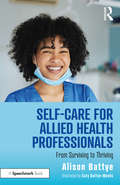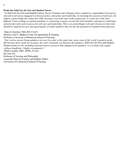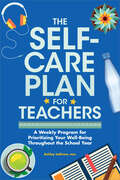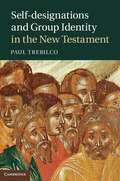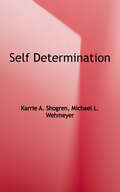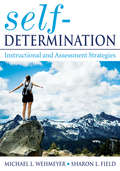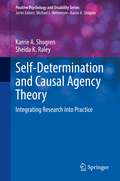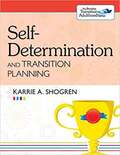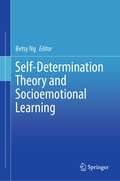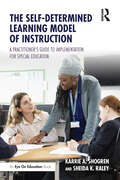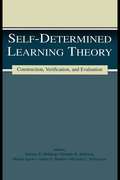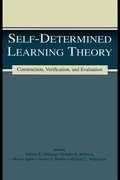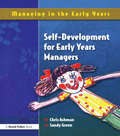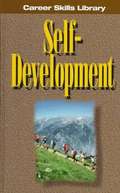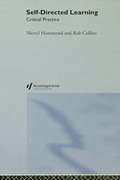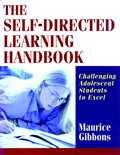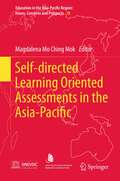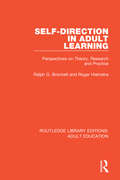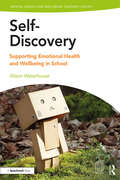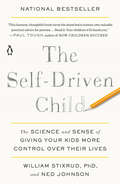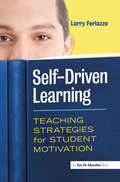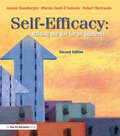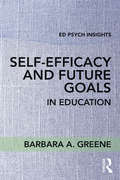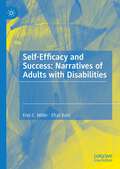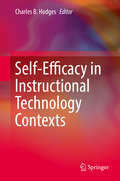- Table View
- List View
Self-Care for Allied Health Professionals: From Surviving to Thriving
by Alison BattyeSelf-Care for Allied Health Professionals brings together a collection of self-care strategies into one easy-to-read volume, supporting Allied Health Professionals to do the best for their patients by caring for themselves. The book offers information and practical strategies to look after your physical and emotional wellbeing at home and in the workplace, exploring topics such as sleep and food, resilience and meditation, stress, conflict and adversity. Written to be a flexible tool that can be read cover to cover or dipped in and out of as needed, it offers rapid response self-care strategies alongside more lasting changes, supporting practitioners to make small steps to build healthy habits for the future. Key features of this book include: –– A combination of quick response strategies, like a five-minute breathing exercise you can use before a difficult meeting, and opportunities for deeper work, examining your purpose and aligning your role with your values. –– Combines ancient practices of meditation and mindfulness with the latest research on nutrition, exercise, sleep and wellbeing. –– Consideration of the challenges professionals face in the context of pandemics and a changing health and social care landscape, helping you to thrive in a challenging world. Self-care has never been more important. This is a book that every Allied Health Professional and trainee should have on their desk, to improve productivity, enhance job satisfaction and build resilience for whatever the future brings.
Self-Care for New and Student Nurses
by Dorrie Fontaine Tim Cunningham Natalie MayWhile you have chosen one of the most noble professions, you have also chosen one of the most difficult. In your career, you will face challenges big and small, whether it is a problematic coworker, the death of a favorite patient, or a global pandemic. You will have bad days or weeks when you ask yourself why you didn't choose a less demanding path in life. You will experience exhaustion, frustration, and grief. You will balance not only your nursing responsibilities, but also your commitments to your family and community. But as you question your life choices and wonder how you can take one more step forward, that voice inside you will whisper, "You are a nurse." <p><p>Our goal in writing this book is that you never have to betray that voice. No matter what comes your way, you will have the strength, skills, and resilience to keep moving forward. But let us be clear: we do not want you to move forward at the expense of yourself or your well-being. We want you to move forward with wisdom and clarity of purpose by using every resource you can muster. We hope that what is contained in this book will become a valuable resource throughout the early years of your career, and even beyond. <p><p>We welcome you on this journey, and we hope you welcome the opportunity to explore the concept of self-care, what it means, what works best for you, and how it can help you flourish in good times and help you grow in difficult ones.
The Self-Care Plan for Teachers
by Ashley LaGrow M.S.Ed.This back to school season, prioritize your mental health and create a more successful classroom.Teaching can be demanding and rewarding at the same time. As you prepare for back to school time, it's crucial to prioritize your well-being to create a successful classroom. Find practical ways to prioritize your well-being with this self-care guide, created especially for teachers. It's organized to help you through the entire school year, with weekly prompts, practices, and tips to help you alleviate stress and feel energized to take on the next lesson! A plan for the year—Feel great with 36 weeks of inspiration and self-care activities, including taking yourself on a field trip, creating a gratitude jar, and indulging in your favorite food.Time to reflect—Solidify your self-care routine as you think about the benefits from each week's activities, from setting intentions to keeping a calendar and making time to have fun.Brighten your outlook—Cultivate a sense of calm with uplifting affirmations that help you adopt a more positive mindset and keep you centered.Discover how you can manage school-year stresses with advice from this supportive self-care book.
Self-designations and Group Identity in the New Testament
by Paul TrebilcoWhat terms would early Christians have used to address one another? In the first book-length study on this topic, Paul Trebilco investigates the origin, use and function of seven key self-designations: 'brothers and sisters', 'believers', 'saints', 'the assembly', 'disciples', 'the Way', and 'Christian'. In doing so, he discovers what they reveal about the identity, self-understanding and character of the early Christian movement. This study sheds light on the theology of particular New Testament authors and on the relationship of early Christian authors and communities to the Old Testament and to the wider context of the Greco-Roman world. Trebilco's writing is informed by other work in the area of sociolinguistics on the development of self-designations and labels and provides a fascinating insight into this often neglected topic.
Self-Determination
by Karrie Ann Shogren Michael L. WehmeyerThis book offers specific and clearly described strategies for teaching learners with ASD to become more self-determined in their actions regarding their educational program plans and outcomes.
Self-Determination: Instructional and Assessment Strategies
by Michael L. Wehmeyer Sharon FieldThis teacher-friendly guide presents research-proven instructional techniques that empower students with disabilities to become their own advocates and use effective choice-making, problem-solving, and goal-setting skills.
Self-Determination and Causal Agency Theory: Integrating Research into Practice (Positive Psychology and Disability Series)
by Karrie A. Shogren Sheida K. RaleyThis book introduces Casual Agency Theory as a framework for defining self-determination and describing its development and essential characteristics. It synthesizes the research on promoting and enhancing self-determination and explores implications for practice in a disability context across the life course. The book also highlights future directions for theory, research, and practice in areas of positive psychology and disability. Key areas of coverage include: Theoretical basis of the development of self-determination as well as research findings and implications for practice across the life course. Issues relating to the implementation of evidence-based practices to promote self-determination in a disability context. Potential strategies for overcoming barriers to self-determination through research-based practices. Future directions for further integrating Casual Agency Theory into positive psychology interventions and the systems of supports in the disability field. Self-Determination and Causal Agency Theory is an essential resource for researchers, professors, and graduate students as well as clinicians, therapists, and other professionals in the fields of developmental and positive psychology, educational policy and practice, special education, social work, occupational, speech, and language therapy, public health, and healthcare policy.
Self-determination And Transition Planning, The Brookes Transition To Adulthood Series
by Karrie A. ShogrenSelf-determination has a powerful positive impact on post-school outcomes for young adults with disabilities—but how can educators teach students the skills they need to make their own choices and achieve their goals as they enter adulthood? This empowering guidebook shows the way. Packed with practical, research-validated guidance on explicitly teaching self-determination skills , this book helps educators support students in communicating their interests and needs, setting and reaching goals, and managing their own lives. Ready-to-use worksheets and activities will help students take an active role in their transition planning, and true case stories highlight the benefits of self-determination instruction: smoother transitions, improved behavior, and fulfilling lives beyond the classroom.
Self-Determination Theory and Socioemotional Learning
by Betsy NgThis book approaches the field of socioemotional learning from the perspective of self-determination theory (SDT). The volume examines socioemotional learning (SEL) in schools, higher educational institutions, and workplaces. It is a timely work in its comprehensive presentation of a means of understanding motivation for one’s own work, the motivation of others, stress tolerance, team-working, conflict resolution, as well as dealing with critical situations. Socioemotional learning relates to competencies in a combination of behaviors, cognitions, and emotions that are essential for all individuals’ success, including educational and employment settings. This book presents the most comprehensive discussion of SDT perspectives on socioemotional learning in various domains, ranging from formal to informal settings. This book is an essential resource for social scientists, educators, and researchers working in education, organizational psychology, and family sociology.
The Self-Determined Learning Model of Instruction: A Practitioner’s Guide to Implementation for Special Education
by Karrie A. Shogren Sheida K. RaleyThis practical guide introduces the Self-Determined Learning Model of Instruction (SDLMI), an evidence-based practice designed to promote student self-determination and support educators in enabling students to set goals, create action plans to achieve those goals, and self-evaluate their progress. Chapters explore integration with Multi-Tiered Systems of Supports and culturally sustaining implementation of the SDLMI. Hands-on tools for using the SDLMI to support students engaging in academic learning, transition planning, and community-based activities are provided. This guide also features stories from self-advocate SDLMI researchers and teachers highlighting how the SDLMI can be put in practice. Clear and comprehensive, this book is an essential resource for every educator.
Self-determined Learning Theory: Construction, Verification, and Evaluation (The LEA Series on Special Education and Disability)
by Dennis E. Mithaug Deirdre K. Mithaug Martin Agran James E. Martin Michael L. WehmeyerThis volume brings together four semi-autonomous bodies of research (choice, self-determination, self-regulation, and self-management) to form a new theory of self-engaged learning entitled, Self-Determined Learning Theory. This theory explains why and how students self-engage. It identifies the factors that give students the sense of control over their learning that is needed for sustained, adaptive, and ultimately successful learning. It begins by describing the characteristics of disengaged learners, then describes and illustrates self-determined learning theory within both normal and special populations. It then examines the theory's predictive value across several special population contexts and then concludes with a critique of the theory's credibility and worth. Divided into three sections--theory construction, theory verification, and theory evaluation--this volume is organized using the four steps of a previous book, Learning to Theorize: A Four Step Strategy. Step 1 defines a problem of not understanding something as discrepancy between what is known and not known about a circumstance. Step 2 searches for information and explanations to change the condition of not knowing into a condition of knowing. Step 3 evaluates the credibility and worth of the explanation constructed in Step 2. Step 4 adjusts existing beliefs so they are consistent with the new theory. Although aimed primarily at leaders in special education, it should also appeal to researchers and scholars in psychology, educational psychology, and school psychology who are interested in the applications of self-regulated learning theory--in this case to special populations.
Self-Determined Learning Theory: Construction, Verification, and Evaluation
by Dennis E. Mithaug Deirdre K. Mithaug Martin Agran Michael L. WehmeyerThe authors present a theory that in the field of special education, the process of learning is adjustment, explains why freedom of choice enhances learning.
Self Development for Early Years Managers (Managing in the Early Years)
by Sandy Green Chris AshmanPart of the Managing in the Early Years series, this book provides practical advice about management theory and practice. Tracking the career development of a nursery nurse into a managerial role, this book: Clearly identifies and explains the managerial roles of team leader, senior supervisor, deputy and manager Focuses on the sudden change that takes place as you transcend from colleague to boss Offers advice on what is expected from you as you move into a managerial role provides case-studies that challenge readers to develop their own views whilst learning about management theory gives Links to relevant Early Years management qualification frameworks and the NVQ and Btec National Diploma in the Early Years. Easy to use and apply, this is a must-have for students, assessors, nursery nurses with an interest in career development into management and anyone working within a early-years environment in a managerial role.
Self-Development Skills
by Dandi Daley MackallThe Career Skills Library describes the skills, traits, and attributes that are crucial to success in any field. This series details the competencies identified by the Department of Labor's SCANS (Secretary's Commission on Achieving Necessary Skills) as essential to solid job performance. Each book focuses on one of these skills in the workplace and shows how students can improve that skill while still in school. Self-Development -- Examine traits like dependability, integrity, and honesty that will help you succeed in all areas of your life.
Self-directed Learning: Critical Practice
by Rob Collins Merryl HammondAimed at those educators who wish to make their practice more consistent with progressive educational principles, namely helping learners to take greater control over planning and managing their own learning. The book contains a balance of theory and practical suggestions.
The Self-Directed Learning Handbook: Challenging Adolescent Students to Excel
by Maurice GibbonsThe Self-Directed Learning Handbook offers teachers and principals an innovative program for customizing schooling to the learning needs of individual students-- and for motivating them to take increasing responsibility for deciding what and how they should learn. Whether the students are struggling or proficient, the program is designed to nurture their natural passion for learning and mastery, challenging them to go beyond the easy and familiar so they can truly excel. The program can be introduced in stages in any middle or high school classroom and enables students of diverse abilities to design and pursue independent course work, special projects, or even artistic presentations, community field work or apprenticeships.
Self-directed Learning Oriented Assessments in the Asia-Pacific
by Magdalena Mo MokThe Asia-Pacific region needs to maximize the benefits of education to enable it to compete in an economic future dominated by innovation, in which assessing student progress must be an empowering rather than delimiting factor. This detailed exposition of the theoretical basis and application tools of self-directed learning-oriented assessment (SLOA) reflects the very latest research championed by the Assessment Research Centre at The Hong Kong Institute of Education. Featuring a range of relevant case studies, it explores the varied theoretical issues related to SLOA and offers an integrated view of the system fully in line with the constructivist paradigm of learning which advocates formative rather than summative assessment. Many of the initiatives outlined here are firsts in the region. SLOA is already being applied in many schools with links to the ARC. It is an approach to assessment that acknowledges the centrality of self-directed learning and which positions assessment as a tool to enable and enhance self-directed learning. It draws on several theories of learning and assessment, including the constructivist notion that learning is best achieved when students take ownership of their educational process, setting their own goals and monitoring their own progress towards those goals. SLOA has been the research and service approach of the ARC since 2005. In the intervening years the centre has developed a number of tools to facilitate SLOA learning and assessment, including vertical ability scales, teacher-friendly computer software and packages for self-directed learning.
Self-direction in Adult Learning: Perspectives on Theory, Research and Practice (Routledge Library Editions: Adult Education)
by Ralph G. Brockett Roger HiemstraOriginally published in 1991, this book provides the reader with a comprehensive synthesis of developments, issues and practices related to a self-direction in learning. it presents strategies for facilitating self-directed learning as an instructional method and for enhancing learner self-direction as an aspect of adult personality. The idea of self-directed learning is not a new one but has received renewed attention in education circles and has particular significance for the adult education sector.
Self-Discovery: Supporting Emotional Health and Wellbeing in School (Mental Health and Wellbeing Teacher Toolkit)
by Alison WaterhouseOne of the five books in the Mental Health and Wellbeing Teacher Toolkit, this practical resource focuses on how to support children and young people on a voyage of self-discovery, as they learn to be their own best friend. The book offers research-driven, practical strategies, along with creative material and step-by-step lesson plans to support educators and health professionals. This is a resource book for practitioners looking to have a positive impact on the mental health and wellbeing of the children and young people in their care; both now and in the future. Chapters span key topics including Developing Resilience, Positive Thinking, Emotional Awareness and Self-Efficacy. A complete toolkit for teachers and counsellors, this book offers: Easy to follow and flexible lesson plans that can be adapted and personalised for use in lessons or smaller groups or 1:1 work Resources that are linked to the PSHE and Wellbeing curriculum for KS1, KS2 and KS3 New research, ‘Circles for Learning’, where the introduction of baby observation into the classroom by a teacher is used to understand and develop self-awareness, skills for learning, relationships, neuroscience and awareness of others Sections on the development of key skills in communication, skills for learning, collaboration, empathy and self-confidence Learning links, learning objectives and reflection questions. Offering research-driven, practical strategies and lesson plans, Self Discovery is an essential resource book for educators and health professionals looking for fresh, engaging ways to support the wellbeing of children and young people.
The Self-Driven Child: The Science and Sense of Giving Your Kids More Control Over Their Lives
by William Stixrud Ned Johnson&“Instead of trusting kids with choices . . . many parents insist on micromanaging everything from homework to friendships. For these parents, Stixrud and Johnson have a simple message: Stop.&” —NPR&“This humane, thoughtful book turns the latest brain science into valuable practical advice for parents.&” —Paul Tough, New York Times bestselling author of How Children SucceedA few years ago, Bill Stixrud and Ned Johnson started noticing the same problem from different angles: Even high-performing kids were coming to them acutely stressed and lacking motivation. Many complained they had no control over their lives. Some stumbled in high school or hit college and unraveled. Bill is a clinical neuropsychologist who helps kids gripped by anxiety or struggling to learn. Ned is a motivational coach who runs an elite tutoring service. Together they discovered that the best antidote to stress is to give kids more of a sense of control over their lives. But this doesn't mean giving up your authority as a parent. In this groundbreaking book they reveal how you can actively help your child to sculpt a brain that is resilient, and ready to take on new challenges.The Self-Driven Child offers a combination of cutting-edge brain science, the latest discoveries in behavioral therapy, and case studies drawn from the thousands of kids and teens Bill and Ned have helped over the years to teach you how to set your child on the real road to success. As parents, we can only drive our kids so far. At some point, they will have to take the wheel and map out their own path. But there is a lot you can do before then to help them tackle the road ahead with resilience and imagination.
Self-Driven Learning: Teaching Strategies for Student Motivation
by Larry FerlazzoIn this lively, research-based book, award-winning educator Larry Ferlazzo tackles everyday classroom challenges with creative instructional techniques to help middle- and high-school teachers develop self-motivated and high-achieving students. The practical tips, online resources, and mini-lessons in this book encourage students to take charge of their own learning, boosting their success in and outside of the classroom. Detailed lesson plans in every chapter align with the Common Core English Language Arts Standards and cover a variety of valuable skills, including: Personal responsibility and perseverance Social and emotional learning Standardized test-taking strategies And much more!
Self-Efficacy: Raising the Bar for All Students
by Robert Bertrando Marcia Conti- D' Antonio Joanne EisenbergerThe fourth edition of this highly praised book includes coverage of evidence-based education and No Child Left Behind. Like the previous editions, it offers authoritative and balanced overviews to help you make distinctions between innovative programs backed up by sound research support and “faddish” ideas which lack a research base.
Self-Efficacy and Future Goals in Education (Ed Psych Insights)
by Barbara A. GreeneAs the inner resource that drives us to pursue activities, to put forth effort, and to avoid failure, motivation is key to overall well-being. Self-efficacy and future goals are important to understanding and reinforcing the motivation to learn, especially for students in classroom settings. Written by a leading expert on motivation, this book situates the topic within the broader context of educational psychology research and theory, and brings it to a wider audience. With chapters on the fundamentals of self-efficacy and future goals, their importance for student learning, and how to develop them in educational settings, this concise volume is designed for any education course that includes student motivation in the curriculum. It will be indispensible for student researchers and both pre- and in-service teachers alike.
Self-Efficacy and Success: Narratives of Adults with Disabilities
by Erez C. Miller Efrat KassBased on the analysis of eighteen authentic and inspiring personal stories, this book illustrates how people with severe childhood disabilities achieved extraordinary career success. Growing up, the people surrounding them and environmental conditions helped them develop their self-efficacy. The book is divided into four parts. It begins by discussing the elusive essence of success, especially for people with disabilities. The authors then discuss selfefficacy, and how it pertains to occupations of people with disabilities. Part two (school years) and part three (higher education) address some of the challenges experienced by students with disabilities. It shows how parents and educational figures helped them enhance their self-efficacy. Part two also discusses current and future trends in inclusive education, and recommendations for practitioners. Part three pays attention to some of the unique traits that helped them overcome obstacles. Finally, the authors focus on employment of people with disabilities and explore some of the consequences of the Covid-19 pandemic in light of this. It includes messages of hope to parents, professionals and individuals with disabilities.
Self-Efficacy in Instructional Technology Contexts
by Charles B. HodgesThis edited volume contains reports of current research, and literature reviews of research, involving self-efficacy in various instructional technology contexts. The chapters represent international perspectives across the broad areas of K- 12 education, higher education, teacher self-efficacy, and learner self-efficacy to capture a diverse cross section of research on these topics. The book includes reviews of existing literature and reports of new research, thus creating a comprehensive resource for researchers and designers interested in this general topic. The book is especially relevant to students and researchers in educational technology, instructional technology, instructional design, learning sciences, and educational psychology.
